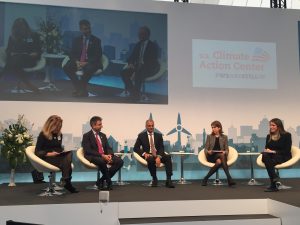Mike
Today was the Business Showcase at the US Climate Action Center. The day was filled with various panels and presentations from business leaders across several sectors, ranging from banks and investment groups (like Bank of America and JP Morgan) to retailers (like Microsoft and Target). These senior leaders came to COP23 to show their support for the emissions reductions targets that underpin the Paris Agreement. They also came to tout their progress in reaching their company’s own emission reductions milestones. One of my favorite panels was “Capital for Decarbonizing,” which featured executives from financial services companies discussing how to finance the transition to a low carbon future. One of the panelists, Val Smith, Citi Bank’s Global Head of Corporate Sustainability, discussed the company’s goal, launched in 2014, to mobilize $100 billion in environmental finance. They are making great progress so far–already having funded $53.5 billion in projects to date. They’re able to do this by using innovative strategies such as creating loan warehouses for energy efficiency or solar projects and then lumping them together to be securitized and sold to investors with less appetite for risk. The panel helped me learn more about the types of innovative financing mechanisms that are needed to help fund the low carbon future required to achieve ambitious emissions reductions and limit global temperature increases to below 2° C, as outlined in the Paris Agreement.
and presentations from business leaders across several sectors, ranging from banks and investment groups (like Bank of America and JP Morgan) to retailers (like Microsoft and Target). These senior leaders came to COP23 to show their support for the emissions reductions targets that underpin the Paris Agreement. They also came to tout their progress in reaching their company’s own emission reductions milestones. One of my favorite panels was “Capital for Decarbonizing,” which featured executives from financial services companies discussing how to finance the transition to a low carbon future. One of the panelists, Val Smith, Citi Bank’s Global Head of Corporate Sustainability, discussed the company’s goal, launched in 2014, to mobilize $100 billion in environmental finance. They are making great progress so far–already having funded $53.5 billion in projects to date. They’re able to do this by using innovative strategies such as creating loan warehouses for energy efficiency or solar projects and then lumping them together to be securitized and sold to investors with less appetite for risk. The panel helped me learn more about the types of innovative financing mechanisms that are needed to help fund the low carbon future required to achieve ambitious emissions reductions and limit global temperature increases to below 2° C, as outlined in the Paris Agreement.
Tim

This morning, I attended a RINGO meeting with Mike. They had in-depth updates about yesterday’s sessions, as well as some tickets to the high-level segment of the negotiations that began today. They only had a limited number of tickets, so they had a lottery to determine which attendees of the RINGO meeting would get one. As luck would have it, the business card that I threw into the pile was one of the winners. Attending the actual negotiations was one of the things that I was most excited to do here at COP23, and getting a ticket to hear the heads of state speak was made me feel a bit like Charlie Bucket. I’ll have a full synopsis of the segment in my upcoming blog post, but for the time being, let’s just say it was cool.
Sarah
I attended a discussion on bipartisan American solutions to climate change, as well as one on how California and Germany could work together to generate business and policy solutions to climate change. One of the most interesting points I found was discussed by a senior policy advisor, who spoke about the issue of making climate change a micro-issue (such as in a national security framework, so one that avoids the politically hot topic in certain states) to make sure policy change can still occur. He said while this might ensure some action now, it avoids actually talking about the larger issue, climate change. There is no easy answer to deciding how to address this problem, but I found it an interesting and valid point, especially as U.S. states decide if and how to engage other states in the US Climate Alliance.